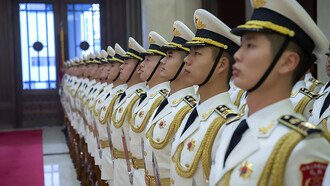Forty years ago, Marshal Josip Broz Tito died in Ljubljana, Slovenia, to be buried in Belgrade in the largest state funeral in history with the attendance of representatives from 128 countries: 4 kings, 31 presidents, 6 princes, 22 prime ministers and 47 chancellors1. And 29 years ago, in 1991, the Federal Socialist Republic of Yugoslavia disappeared from the map of Europe after a bloody civil war and foreign intervention, ending the period of peace that Europe had seen since the end of the Second World War.
Tito was a Croatian born into a peasant family, under the Austro-Hungarian empire. He specialized as a locksmith, emigrated to Vienna, was recruited by the imperial army, and sent to the front in the First World War. He was taken prisoner and sent to Siberia from where he escaped to then witness the Russian Revolution. Back in Zagreb, he joined the Communist Party and was imprisoned for six years before leaving once again for Moscow where he saw Stalin's purges and the annihilation of many of his Yugoslav companions.
Upon his return to his home country, he went into hiding from where he became the leader who restructured the communist party which reached 12,000 militants at the beginning of the armed resistance against the German invasion, in 19411. Tito left for the mountains to join the Partisan Army of Liberation against mainly Italian and German invaders.
Those were years of hardship, of death, of war against the occupiers and their Yugoslav allies: the Croatian Ustashas and the Serbian Chetniks, both cruel in their atavistic hatreds. Germany imposed a puppet state in Croatia (1941-1945) with the complicity of the Ustashas, the clergy and Cardinal Aloysius Stepinac, who as an archbishop blessed the German troops when they entered Zagreb. The Ustashas created Jasenovac, one of the worst death camps during WWII, where at least 100,000 Serbs, Communists, Jews, and patriots were killed. For their part, the Chetniks, extreme Serbian nationalists, monarchists, anti-communists, allies of the Italians, fought against Tito's forces and against the Croatian Ustashas, committing atrocities against the prisoners.
Tito, at the head of the Communist Party and the patriotic forces of the Yugoslav People's Army, liberated and cleaned the country of Ustashas and Chetniks. During the War, Yugoslavia was invaded by five foreign armies from Germany, Italy, Hungary, Bulgaria, and Romania, which together with the new Croatian State were part of Hitler's "puppet" allies.
In Yugoslavia, it was not the Soviets that defeated Germany and its allies, as was the case in Eastern Europe. Tito liberated his country without the participation of the Red Army, except for the support that it provided for the liberation of Belgrade. This gave him the legitimacy to start his own search for a path to socialism. When Stalin tried to align Tito to his orders, in 1948, came the rupture, the expulsion of the Yugoslav communists from the Cominform. In those years, it was not easy to oppose Moscow, the hegemony it had already imposed in the world communist movement, and less so the Soviet propaganda machine that dedicated itself to slandering Tito and his revolution. Stalin boasted that it was enough for him to move his little finger to make him fall. It was not so, and he even tried to assassinate him on several occasions. Tito sent him a letter, which is said to have been found among the papers that Stalin kept in his safe at the time of his death. In it he said that on five occasions the assassins had been captured: "Stop sending people to kill me. I will send only one, and it will not be necessary to send more." 3
The rupture with Moscow had harsh consequences in Yugoslavia, there was the persecution of communists accused of being pro-Soviets along with executions, concentration camps and political prisoners. Tito started a new path based on self-managed socialism with open borders that allowed free emigration, limited market economy, private property of small companies and land, which made a substantial difference with the other socialist countries. He also obviously did not adhere to the Warsaw Pact, the Moscow-led military alliance.
The socialism built by the Yugoslav communists, with its peculiarities, was a one-party dictatorship, without political or press freedom, with the cult of personality around Tito well-developed.
In the midst of the Cold War, in 1961, Tito, together with the Egyptian leader Gamal Abdel Nasser and the Indian Prime Minister, Sri Pandit Nerhu, promoted the creation of the Non-Aligned Movement, which had more than 100 member countries at the time of his death in 1980. With great vision, they declared themselves not followers of the policies of neither Moscow nor Washington, generating broad adherence by developing countries and condemning colonialism, promoting self-determination and independence, and actively supporting peace. The sixties and seventies of the last century gave Yugoslavia prestige and respect for its efforts and commitments on major issues on the world agenda. It was a strong State, with a victorious story of a leader who confronted Hitler and Stalin, with a powerful army in Europe, a country that counted on the international scene.
Tito's death, the lack of a leader, the fall of the Berlin Wall, the disappearance of the Soviet Union, were part of the elements that led to the start of the civil war and the dismemberment of Yugoslavia, a country that had been born at the end of the First World War, in 1918. It was a creation of the victorious powers that brought together Serbs, Croats, Slovenes and around twenty ethnic minorities.
In 1998, Germany was the main supporter of the country's division and dismemberment. Berlin, all by itself, without the support of the then European Community or the United States, was the first to recognize the independence of Slovenia, and this was the step to unleash the civil war. Lackluster leaders in Croatia and Serbia, imbued with primitive nationalism, gave birth to six new countries and to one still seeking international recognition. Two of these Balkan states, Slovenia and Croatia, managed to enter the European Union, while the others wait in line.
Ethnic cleansing and the civil war left more than 120,000 dead, many thousands wounded, women raped, cities destroyed. NATO bombed Belgrade leaving 5,000 victims. The question is still floating in the air: where was the European Union, where the UN?
None of the new countries that emerged have much weight on the international scene, and neither has the respect that Tito’s Yugoslavia enjoyed.
1 Goldstein, Ivo i Slavko. Tito. Profil, Zagreb, 2015, p.796.
2 Ibid., p.177.
3 Ibid. and Simon Sebag, quoted in La Vanguardia.















